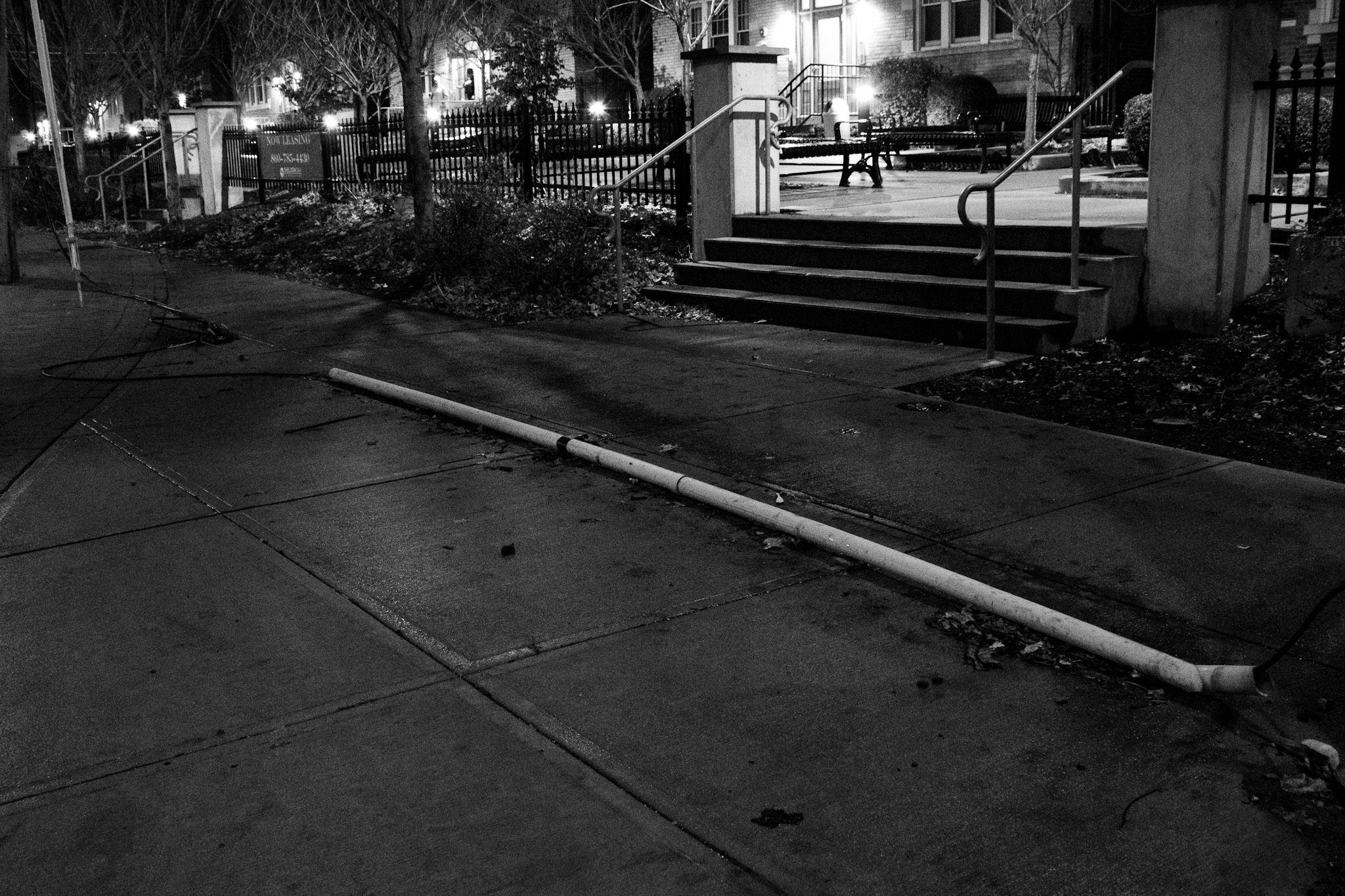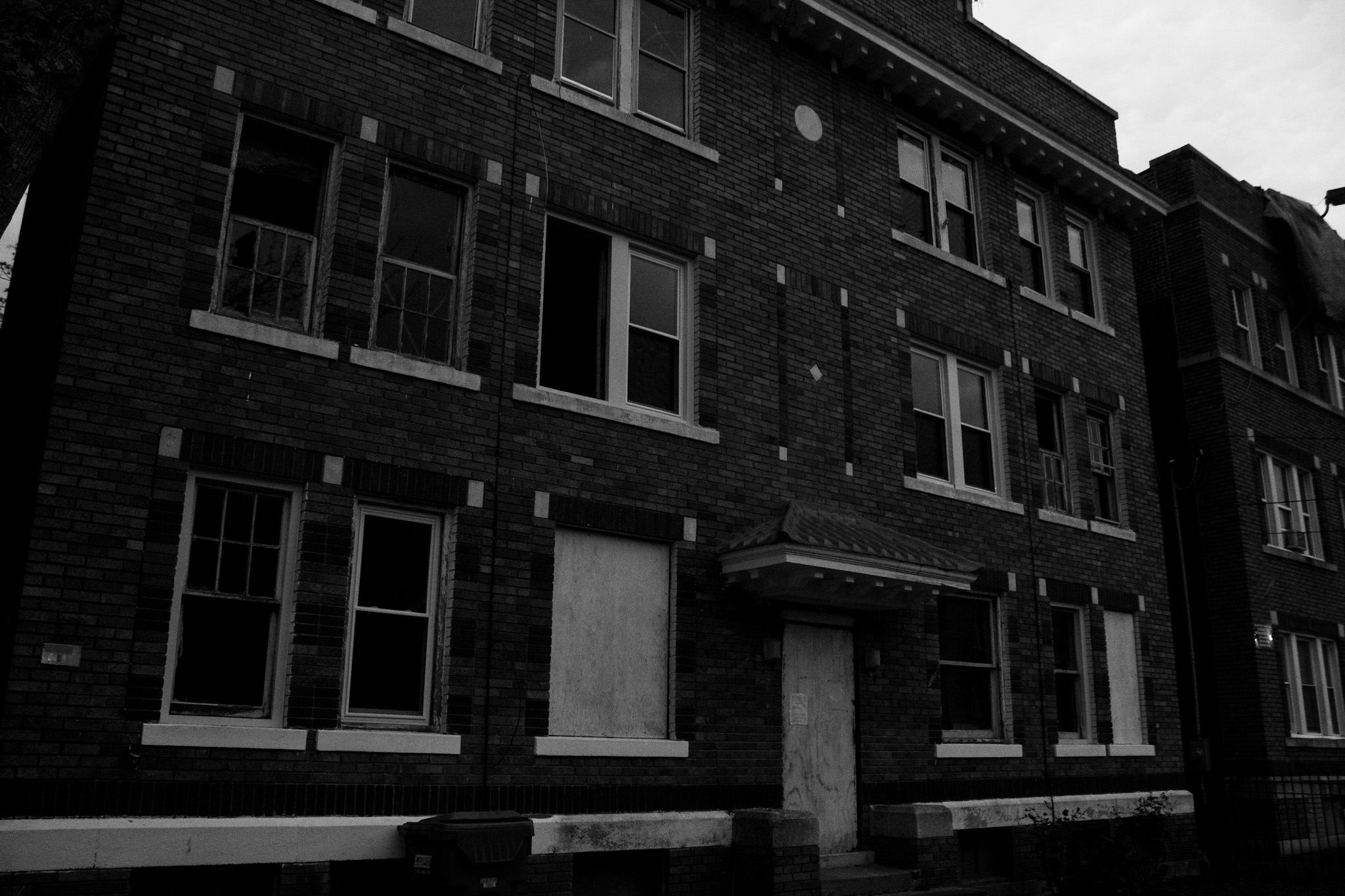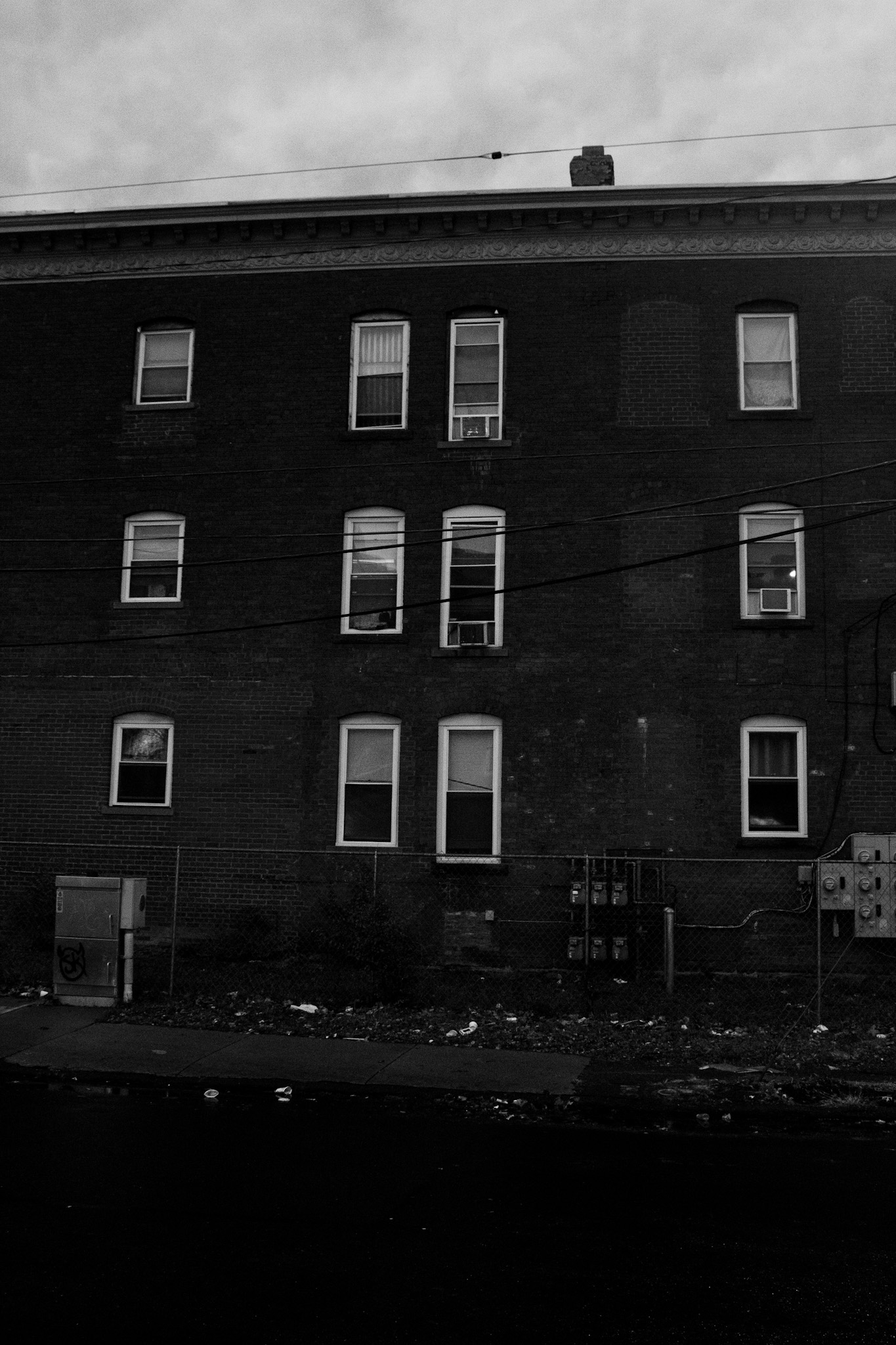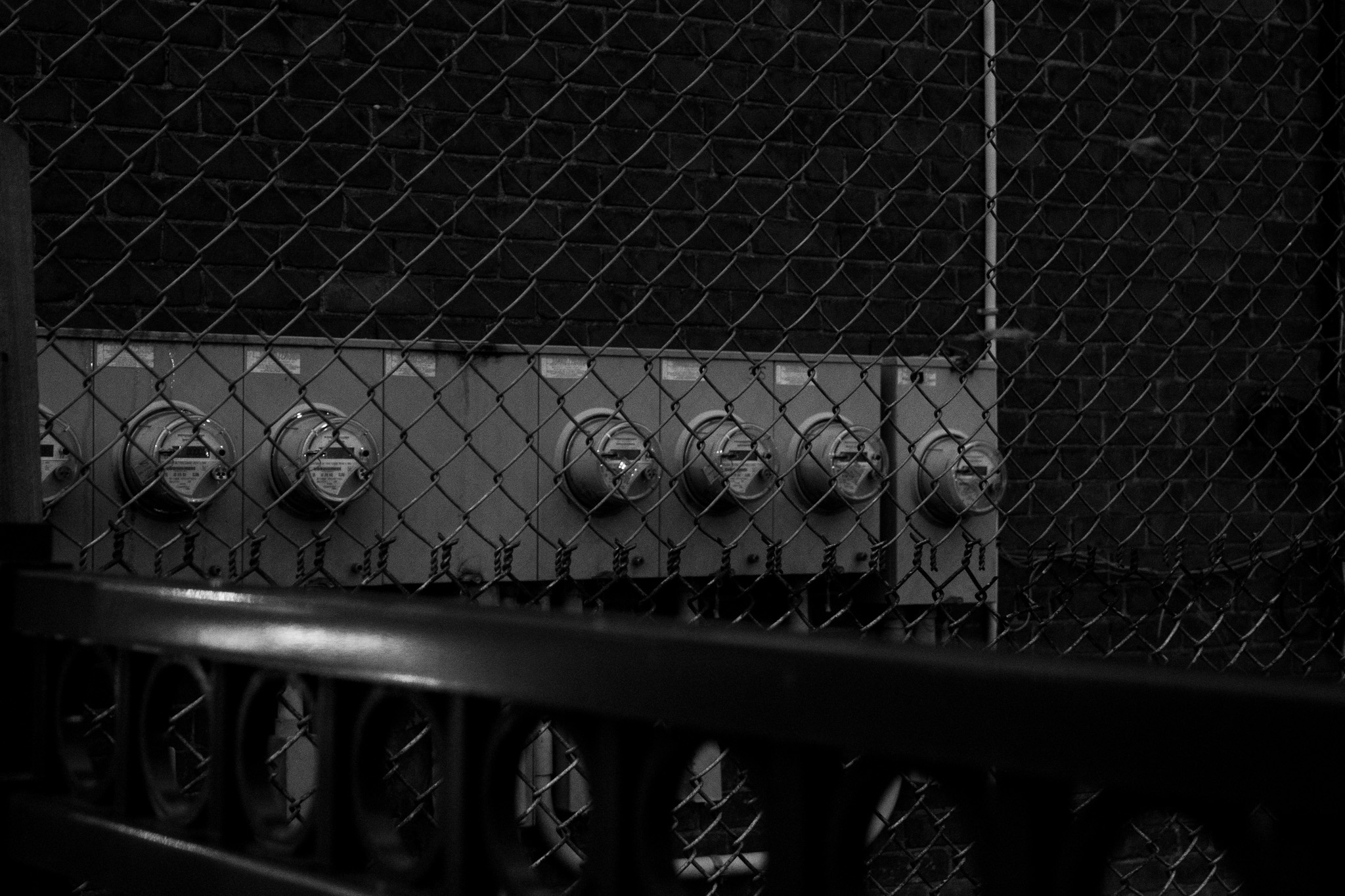Bizzie is a Hartford-born and raised young emerging photographer. Her photographic essay, done in black and white, explores Energy Burden in Upper Albany from a public perspective. She navigates the streets of the neighborhood, pointing the camera to building’s facades, sidewalks, storefronts, and bus stops to show how gentrification, disinvestment, and poverty intermingle with Energy Burden in very visible ways.
Bizzie guided us through Upper Albany, a neighborhood she knows very well. Her knowledge duels from housing policies to family anecdotes. From the four photographers she is the one that decided to take the camera to the streets, which for the reader is an opportunity to take a direct look at Upper Albany from a pedestrian perspective.
Bizzie started the photo sharing session speaking about an image that is not present in her photographic essay which is a common image in the cold winters in Upper Albany.
“I would have liked to have found a photograph of someone who had like the black bags of black plastic over their windows. But I didn’t get a chance to find anyone who had that yet. It is like an insulation thing. When you like if you have a crack window or if like the window itself is not insulated properly, you’ll put like, you’ll take a garbage bag, cut it like into the square and tape it onto the window so that no air is getting through your windows. They do it in cars, you know. But they do it they do it at apartments too kind of.” Bizzie
After sharing this, Bizzie shared with us this powerful image in which Energy Burden appears depicted in a different way: electricity as a hazard.

“But right here like in the middle of the frame, there’s literally exposed wires on Vine Street, exposed wires on the street and seeing this for me it’s like we’re paying all this money for electric bills, but our grids are barely like stable, barely up to par.” Bizzie
“I have a couple pictures of the of the of these exposed wires but literally like it’s duct taped up here, not duct tape, but like it’s taped up here with some red tape, trying to hold it together. So it’s not like falling apart. I’m just like, wow, why is nobody called, you know, the city to talk to do this? Like, why is this not being addressed? Is this something you’ve seen before throughout Hartford happens; it doesn’t happen I will say happens often. But very often when things like this happen, or like say like when the wires freeze over in the wintertime, this area is like one of the last areas to be taken care of. And this is like a very dangerous thing to have out in public.” Bizzie
Bizzie also looked at decaying buildings in the neighborhood that often are semi-occupied to explain how “slum lords,” a phrase that repeatedly appeared during this research project, let buildings deteriorate while waiting for market value prices to rise under a growing process of gentrification. Current tenants, in the meantime, had to deal with falling apart buildings without investment creating perfect niches to exacerbate Energy Burden situations such as higher gas and electric bills due to bad weatherization, inefficient furnaces, and so on.
Landlords also emerged as obstacles for tenants to obtain benefits to address situations related to Energy Burden. Many participants said even though they were eligible to receive support from different organizations it was common these had to be approved by landlords who usually preferred to leave things unresolved and let tenants deal with high gas and electric bills.
“Yeah, and like my old building, the electric company sent us something or CRT or something sent us something saying that they would you upgrade the apartment for energy efficiency. But in order to have it done, I had to get my landlord to sign the paperwork. And when I brought the paperwork to my landlord, he had these other ideas that some company that his wife was attached to was going to do this work instead. Never happened and I lived there for eight years. And this was the first year that I asked him about it. So I never got the paperwork signed that was required to be signed before they could energy put energy efficient stuff stuff in my apartment, because the landlord didn’t want to do it. And you know as far as I’m concerned if I’m the one paying the gas electric bill, I should be able to have my apartment upgraded without permission from the landlord. Yeah, especially since it’s gonna benefit him in the long run. Right, that’s an improvement his building.” Bizzie

Upper Albany in North Hartford is an Afro-Caribbean enclave with enormous inequality which due to its closeness to Hartford’s downtown is calling the attention of local and foreign capital willing to invest in real estate and redevelopment. The quantitative and qualitative data we collected in this research project clearly shows that there is a process of gentrification happening in Upper Albany, which is magnifying experiences of Energy Burden in this neighborhood and other areas of Hartford. Bizzie told us there is a a trend of New York City conglomerates buying whole buildings in the Upper Albany area.

“They just let them finish. It’s almost like a tree, you know, you go to you let it grow. Let it grow, you let it grow and grow until it dies itself. Or you let it Oh, you ate it in a dying, which we did, which is what they usually do with these apartments. And once it dies, you can cut it down and start a new one. And that’s kind of what they do with these apartments. They just let them go like people who can’t afford people can’t afford their rent, who can’t afford their bills, they want to build something just like them. And because of the neighborhood, they can’t find somebody else to move in. And these buildings, eventually just the landlord let go of them. They end up just becoming foreclosed properties and getting trained to banks and back to the city and see what thanks don’t do anything with them for years” Bizzie
Finally, Bizzie touched on another aspect which deals with how common buildings that offer utilities included not do so with gas often because their heating systems use gas with old machinery that added to bad weatherization leads to tenants heaving to pay huge amounts of money in gas bills.
“About the age of some of these properties. A lot of these build buildings still have gas heating, instead of electric and even wants to do electric they’re still expensive bills. Because there’s so many people living in that building. It’s I feel like it’s almost a scam. The photo we said before, like it’s almost a scam when they say like oh, electricity is included. Yeah, but they don’t tell you that. Use don’t tell you to use your electric your electricity wisely. Like even if it’s not gas heating it or if it’s electric heating, depending on how much you use it to your house, your electrical soon to be a lot higher than somebody.” Bizzie
